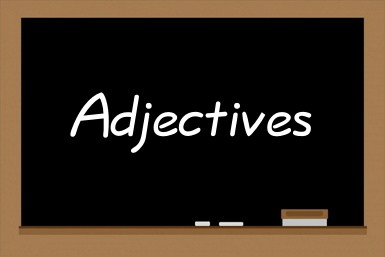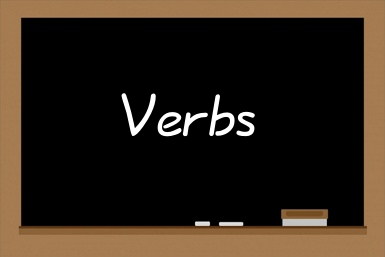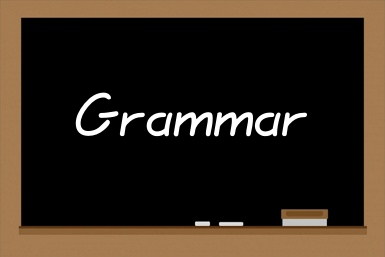The Aderalingua Blog
Present Tense of Spanish Verbs
 In this lesson of the Learn Spanish course, you'll learn how to use the present tense and present progressive
tense of Spanish verbs. You'll learn how to conjugate regular verbs, as well as some
of the very common irregular verbs in Spanish.
In this lesson of the Learn Spanish course, you'll learn how to use the present tense and present progressive
tense of Spanish verbs. You'll learn how to conjugate regular verbs, as well as some
of the very common irregular verbs in Spanish.
Online flashcards and a quiz are included in the lesson to help you learn.
English Vocabulary - People
The "People" lesson is now available as a free lesson for the English Vocabulary course. This lesson includes English words for people and parts of the human body. Useful phrases in English related to families, health and feelings are also included.
Online flashcards and a quiz are included to help you learn the English words for people and parts of the human body.
English Vocabulary - Adjectives
 The Adjectives lesson of the English Vocabulary course is now available. Learn
some very common English adjectives, as well as some common sentence forms that
are used with adjectives.
The Adjectives lesson of the English Vocabulary course is now available. Learn
some very common English adjectives, as well as some common sentence forms that
are used with adjectives.
This lesson includes online flashcards and a quiz to help you learn the adjectives included in this lesson.
Versions of the lesson are available for Arabic, Chinese, French, Portuguese, and Spanish speakers.
Periods, Question Marks, and Exclamation Points
 In this topic we cover the punctuation used to end sentences. In English all sentences end
in a period, question mark, or exclamation point. The uses of each of these are discussed
below.
In this topic we cover the punctuation used to end sentences. In English all sentences end
in a period, question mark, or exclamation point. The uses of each of these are discussed
below.
English Vocabulary 2 for French Users
 The English Vocabulary 2 course is now available for French speakers. Audio files
are included to help you pronounce the words correctly. Flashcards are included to
help you remember the words. Online quizzes are included to help you test your
English vocabulary.
The English Vocabulary 2 course is now available for French speakers. Audio files
are included to help you pronounce the words correctly. Flashcards are included to
help you remember the words. Online quizzes are included to help you test your
English vocabulary.
The lessons in this course include:
- Verbs
- Adverbs
- Prepositions
- Adjectives
- Clothes
- Outdoor Activities and Sports
The French version of the course can be found here: Vocabulaire Anglais 2.
English Vocabulary for French Users
 The English Vocabulary course is now available for French speakers. Audio files
are included to help you pronounce the words correctly. Flashcards are included to
help you remember the words. Online quizzes are included to help you test your
English vocabulary.
The English Vocabulary course is now available for French speakers. Audio files
are included to help you pronounce the words correctly. Flashcards are included to
help you remember the words. Online quizzes are included to help you test your
English vocabulary.
The lessons in this course include:
- Introduction and Greeting Phrases
- Common English Phrases
- Colors
- People
- At Home
- Nature
- Food and Drinks
- Date and Time
- Transportation
- Adjectives
The French version of the course can be found here: Vocabulaire Anglais.
The Comma
Learning to use commas correctly is one of the more difficult aspects of English grammar. In this lesson we'll go over the proper use of the comma.
Continue Reading ...
English
中国语文
En Español
The Apostrophe
There are two uses of the Apostrophe in English:
- To show that a word has been shortened
- To show the possessive case of a noun
This lesson will go over both of these uses.
Continue Reading ...
English
中国语文
En Español
Expressing Ability, Possibility and Obligation
 In this lesson we'll learn how to express Ability, Possibility, and Obligation. First
We'll learn about the modal verbs can, may, will, shall, and must, which are often
used to express these ideas.
In this lesson we'll learn how to express Ability, Possibility, and Obligation. First
We'll learn about the modal verbs can, may, will, shall, and must, which are often
used to express these ideas.
Modal Verbs
Modal verbs are a special class of verbs that act very differently from other verbs. The common modal verbs in English are can, may, must, shall, and will. These verbs are very common in English, so it is worth spending time to learn how to use them properly.
Modal verbs are only used in the present or simple past tense. The past tense of modal verbs sometimes indicate uncertainty. The modal verb must is only used in the present tense. Modal verbs always have the same form in the present tense. An s is never added to the end. Modal verbs do not have an infinitive form. The verb do is not used with modal verbs when asking questions or in negative statements.
Continue Reading ...
English
中国语文
En Español
Phrases, Clauses, and Sentences
 A sentence is a collection of related words. The description of the parts that
make up a sentence and the rules used to correctly combine words together to make
a sentence form the grammar of a language. In this post we'll go over the
definitions of some common English grammar terms related to sentences.
A sentence is a collection of related words. The description of the parts that
make up a sentence and the rules used to correctly combine words together to make
a sentence form the grammar of a language. In this post we'll go over the
definitions of some common English grammar terms related to sentences.
Subject and Predicate
The subject and predicate are the two parts of a sentence.
The complete subject consists of all the words that tell who or what the sentence is about. In the following sentence the complete subject is in bold.
The white cat will run away.
Simple Subject
The simple subject is the key noun in the sentence. In the following sentence the simple subject is in bold.
The white cat will run away.
Continue Reading ...
English
中国语文
En Español
This and That
The words this and that can be used both as demonstrative adjectives and demonstrative pronouns. A demonstrative adjective is used to indicate a specific noun. A demonstrative pronoun is a pronoun that replaces a specific noun. This lesson includes several examples to show how they are used.
Continue Reading ...
English
中国语文
En Español
Confusing Verbs
There are a some pairs of closely related verbs in English that tend to cause confusion. Learning about transitive and intransitive verbs will help to make these verbs less confusing. this post will talk about transitive and intransitive verbs, as well as discuss the verbs sit, set, lie, lay, rise and raise.
Continue Reading ...
English
中国语文
En Español
Using 'Used To'
The phrase used to is very common in English and has a few different meanings, which are discussed below.
1) To be used to means to be accustomed to, or to be familiar with.
2) When used to follows a noun or pronoun it means an action was repeated in the past, but does not currently happen.
3) Used to can also be the past tense of the verb phrase "use to".
Continue Reading ...
English
中国语文
En Español
Progressive Tenses
Progressive tenses, also called continuous tenses, express the idea that an action is in progress during a particular time period. Progressive tenses are formed with the verb "be" and the present participle of a verb. There are three progressive tenses in English:
- past progressive
- present progressive
- future progressive.
Continue Reading ...
English
中国语文
En Español
Phrasal Verbs
A phrasal verb is a compound verb made up of a verb and a preposition, a verb and an adverb, or a verb and both an adverb and a preposition. The meaning of a phrasal verb cannot always be guessed by looking at the individual words.
Phrasal verbs are very common in English, especially in informal and spoken English. Many phrasal verbs are replaced by verbs of latin origin in more formal writing.
Continue Reading ...
English
中国语文
En Español
English Prepositions
A preposition is a connecting word that shows the relationship between a noun or pronoun and another word, usually the subject in a sentence. They are commonly used to give information about time or location.
Prepositions are usually placed after the verb and before the noun or pronoun they are associated with. The noun following the preposition is never the subject of a sentence.
Continue Reading ...
English
中国语文
En Español
Learn English Online Lesson 7 - Adjectives and Adverbs

Lesson 7 from the Learn English Online course is now available as a free lesson. This lesson covers:
1) Adjectives
2) Adverbs
Flashcards are included to help you learn common English adjectives and adverbs. Test your understanding of the material with the included quiz.
The lesson can be found here:
- Arabic: Learn English Online Lessson 7
- Español: Learn English Online Lessson 7
- Português: Learn English Online Lessson 7
- 中文: Learn English Online Lessson 7
Learn English Online Lesson 6 - Asking Questions

Lesson 6 from the Learn English Online course is now available as a free lesson. This lesson covers:
1) Asking questions in English
2) Making negative statements
3) The verb to do.
Test your understanding of the material with the included quiz.
The lesson can be found here:
- Arabic: Learn English Online Lessson 6
- Español: Learn English Online Lessson 6
- Português: Learn English Online Lessson 6
- 中文: Learn English Online Lessson 6
Learn English Online Lesson 5 - Present tense

Lesson 5 from the Learn English Online course is now available as a free lesson. This lesson covers:
1) The present tense of English verbs
2) The English words for colors
3) The verb to have.
Test your understanding of the material with the included quiz.
The lesson can be found here:
- Arabic: Learn English Online Lessson 5
- Español: Learn English Online Lessson 5
- Português: Learn English Online Lessson 5
- 中文: Learn English Online Lessson 5
Learn English Online Lesson 4 - To Be

Lesson 4 from the Learn English Online course is now available as a free lesson. This lesson covers:
1) The verb "to be"
2) Pronouns
3) Contraction of the verb be with pronouns.
Test your understanding of the material with the included quiz.
The lesson can be found here:
- Arabic: Learn English Online Lessson 4
- Español: Learn English Online Lessson 4
- Português: Learn English Online Lessson 4
- 中文: Learn English Online Lessson 4
Learn English Online Lesson 3 - Nouns

Lesson 3 from the Learn English Online course is now available as a free lesson. This lesson covers:
1) Nouns and the plural of nouns
2) The definite article
3) The indefinite article
4) Words for people
5) Numbers from 1 - 20.
The lessons contain online flashcards to help you learn the English words for people. The lesson can be found here:
- Arabic: Learn English Online Lessson 3
- Español: Learn English Online Lessson 3
- Português: Learn English Online Lessson 3
- 中文: Learn English Online Lessson 3
Learn English Online Lesson 2 - Introductions
 Lesson 2 from the Learn English Online course is now available as a
free lesson. This lesson covers the pronunciation of consonants in English, and
includes some common phrases for introducing yourself and greeting others.
Lesson 2 from the Learn English Online course is now available as a
free lesson. This lesson covers the pronunciation of consonants in English, and
includes some common phrases for introducing yourself and greeting others.
The lessons contain online flashcards to help you learn English phrases for introducing yourself and greeting others. The lesson can be found here:
- Arabic: Learn English Online Lessson 2
- Español: Learn English Online Lessson 2
- Português: Learn English Online Lessson 2
- 中文: Learn English Online Lessson 2
English Vocabulary 2 Course
 The Aderalingua English Vocabulary 2 course is now online. This course is designed for
people who are learning English as a foreign language, and teaches common English
words and phrases. Many pictures are used in the lessons to help you associate
English words to the objects they represent. Flashcards are included in most
lessons to help you learn useful English words and phrases.
The Aderalingua English Vocabulary 2 course is now online. This course is designed for
people who are learning English as a foreign language, and teaches common English
words and phrases. Many pictures are used in the lessons to help you associate
English words to the objects they represent. Flashcards are included in most
lessons to help you learn useful English words and phrases.
The lessons in this course include:
- Verbs
- Adverbs
- Prepositions
- Adjectives
- Clothes
- Outdoor Activities and Sports
- In the city
- Abstract nouns
The lessons contain online flashcards to help you learn English words and phrases used in everyday life. Online quizzes are included in the lessons to help you see how well you know the English words included in the lessons.
The course can be found here:
- Arabic: Aderalingua English Vocabulary 2
- Español: Aderalingua English Vocabulary 2
- Português: Aderalingua English Vocabulary 2
- 中文: Aderalingua English Vocabulary 2
English Vocabulary Course
 The Aderalingua English Vocabulary course is now online. This course is designed for
people who are learning English as a foreign language, and teaches common English
words and phrases. Many pictures are used in the lessons to help you associate
English words to the objects they represent. Flashcards and a quiz are included
in the lessons to help you learn useful English words and phrases.
The Aderalingua English Vocabulary course is now online. This course is designed for
people who are learning English as a foreign language, and teaches common English
words and phrases. Many pictures are used in the lessons to help you associate
English words to the objects they represent. Flashcards and a quiz are included
in the lessons to help you learn useful English words and phrases.
The lessons in this course include:
- Introduction and Greeting Phrases
- Common English Phrases
- Colors
- Numbers
- People
- At Home
- Nature
- Food and Drinks
- Date and Time
- Transportation
- Adjectives
The course can be found here:
- Arabic: Aderalingua English Vocabulary
- Español: Aderalingua English Vocabulary
- Português: Aderalingua English Vocabulary
- 中文: Aderalingua English Vocabulary
Icelandic Phrases Course

The Aderalingua Icelandic Phrases course is now online. In this course you'll learn some common Icelandic words and phrases. Many of the lessons contain online flashcards to help you learn these useful words and phrases that are used in everyday life.
This course includes:
- Introduction and Greeting Phrases
- Common Icelandic Phrases
- Colors
- Numbers
- People
- Common Adjectives
The course can be found here: Aderalingua Icelandic Phrases.
French Vocabulary Course
 The Aderalingua French Vocabulary course is now online. In this course, you'll
learn common French words and phrases.
Many pictures are used in the lessons to help you associate French words to
the objects they represent. Flashcards and a quiz are included in most lessons
to help you learn useful French words and phrases.
The Aderalingua French Vocabulary course is now online. In this course, you'll
learn common French words and phrases.
Many pictures are used in the lessons to help you associate French words to
the objects they represent. Flashcards and a quiz are included in most lessons
to help you learn useful French words and phrases.
The lessons in this course include:
- Introduction and Greeting Phrases
- Common French Phrases
- Colors
- Numbers
- People
- Food and Drink
- Transportation
- At home
- Nature
- Date and Time
- In the City
- Clothes
- Adjectives
- Verbs
- Adverbs
- Prepositions
The course can be found here: Aderalingua French Vocabulary.
English Vocabulary - Nature Lesson

A new lesson is available for the English Vocabulary course. This lesson covers English vocabulary related to nature, such as plants, animals, and natural objects. Pictures are shown along with the words to make it easier to learn them.
The lesson also includes online flashcards and a quiz to help you learn English words related to nature.
- Arabic: Lesson 7 - Nature
- Spanish: Lesson 7 - Nature
- Portuguese: Lesson 7 - Nature
- Chinese: Lesson 7 - Nature
New Aderalingua Learn Spanish Course
 The Aderalingua Learn Spanish course is now online. In this course, you'll
learn common Spanish words and phrases, as well as basic Spanish grammar.
Many pictures are used in the lessons to help you associate Spanish words to
the objects they represent.
The Aderalingua Learn Spanish course is now online. In this course, you'll
learn common Spanish words and phrases, as well as basic Spanish grammar.
Many pictures are used in the lessons to help you associate Spanish words to
the objects they represent.
Online flashcards are included in most lessons to help you learn useful Spanish words and phrases. The lessons contain online quizzes so you can see how well you know the Spanish vocabulary and grammar included in the lessons.
The lessons in this course include:
- Introduction and Greeting Phrases
- Common Spanish Phrases
- Colors
- Numbers
- People
- Food
- Transportation
- At Home
- Nature
- Date and Time
- Clothes
- Outdoor Activities and Sports
- In the City
- Nouns
- Pronouns
- Present Tense of Verbs
- Past Tense of Verbs
- Future and Conditional Tenses of Verbs
- Adjectives
- Adverbs
- Conjunctions
The Learn Spanish course can be found here: Aderalingua Learn Spanish.
New Aderalingua German Vocabulary Course
 The Aderalingua German Vocabulary course is now online. In this course, you'll
learn common German words and phrases, as well as basic German grammar.
Many pictures are used in the lessons to help you associate German words to
the objects they represent. Flashcards are included in most lessons to help
you memorize useful German words and phrases.
The Aderalingua German Vocabulary course is now online. In this course, you'll
learn common German words and phrases, as well as basic German grammar.
Many pictures are used in the lessons to help you associate German words to
the objects they represent. Flashcards are included in most lessons to help
you memorize useful German words and phrases.
The lessons in this course include:
- Introduction and Greeting Phrases
- Common German Phrases
- Colors
- Numbers
- People
- Food and Drinks
- Transportation
- At home
- Nature
- Date and Time
- Clothes
- Outdoor Activities
- In the City
- Nouns
- Pronouns
- Verbs
- Adjectives
Most of the lessons contain online flashcards to help you learn the German words and phrases used in everyday life. Online quizzes are included in the lessons to allow you to practice writing German and test your progress.
The course can be found here: Aderalingua German Vocabulary.
Welcome To Aderalingua English
Welcome to Aderalingua English! We are working hard to bring a site that will make learning English an enjoyable experience. Learning a new language opens up new opportunities to learn, explore, and communicate. At Aderalingua Language we combine these elements to make learning English quick, interesting, and rewarding.
Soon there will be some free online lessons available for you to try. As we continue to grow the site we will be adding full courses, practice quizzes, and activities.
Aderalingua Development Begins!
We have begun development of a new and exciting way to learn a new language. There will be courses for learning German, Spanish, French, and English for speakers of other languages.
The courses will focus heavily on learning useful phrases and vocabulary using images and flashcards. The lessons will also contain quizzes to help you practice the language concepts and measure your progress learning the language.